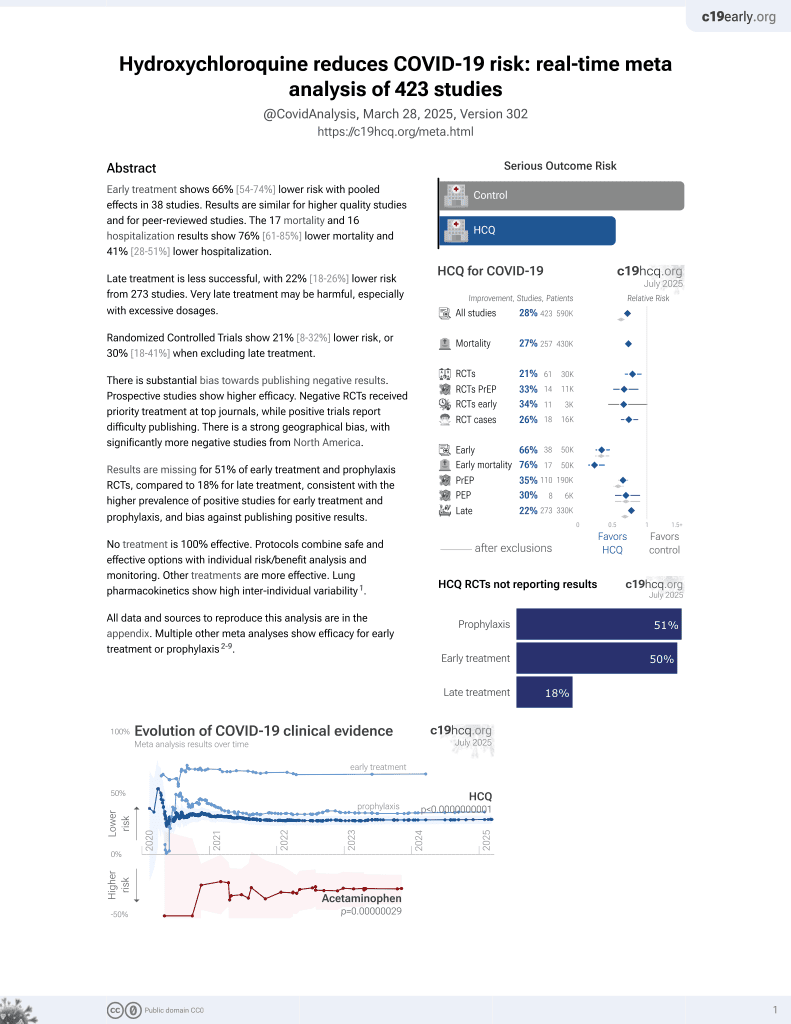Efficacy of chloroquine and hydroxychloroquine in the treatment of COVID-19
et al., Eur. Rev. Med. Pharmacol. Sci. 2020, 24 (8), 4539-4547, doi:10.26355/eurrev_202004_21038, Apr 2020
HCQ for COVID-19
1st treatment shown to reduce risk in
March 2020, now with p < 0.00000000001 from 423 studies, used in 59 countries.
No treatment is 100% effective. Protocols
combine treatments.
6,400+ studies for
210+ treatments. c19early.org
|
Analysis of COVID-19 and malaria, finding that COVID-19 is highly pandemic in countries where malaria is least pandemic, and vice versa, suggesting that CQ/HCQ (widely used for malaria) are protective for COVID-19. This paper also includes a review of 9 articles supporting the efficacy of HCQ and CQ.
Meo et al., 30 Apr 2020, peer-reviewed, 3 authors.
DOI record:
{
"DOI": "10.26355/eurrev_202004_21038",
"ISSN": "1128-3602, 2284-0729",
"URL": "https://doi.org/10.26355/eurrev_202004_21038",
"abstract": "OBJECTIVE: The novel severe acute respiratory syndrome coronavirus 2 (SARS-CoV-2), also called COVID-19, has caused a pandemic which has swiftly involved the entire world and raised great public health concerns. The scientific community is actively exploring treatments that would potentially be effective in combating COVID-19. Hydroxychloroquine has been demonstrated to limit the replication of SARS-CoV-2 virus in vitro. In malarial pandemic countries, chloroquine is widely used to treat malaria. In malarial non-pandemic nations, chloroquine is not widely used. Chloroquine and hydroxychloroquine share similar chemical structures and mechanisms of action. The aim of this study was to indirectly investigate the efficacy of chloroquine and hydroxychloroquine for the treatment of COVID-19 by determining the prevalence of COVID-19 in malaria pandemic and non-pandemic nations. We sought evidence to support or refute the hypothesis that these drugs could show efficacy in the treatment of COVID-19. MATERIALS AND METHODS: We reviewed in vitro studies, in vivo studies, original studies, clinical trials, and consensus reports, that were conducted to evaluate the antiviral activities of chloroquine and hydroxychloroquine. The studies on “COVID-19 and its allied treatment were found from World Health Organization (WHO), ISI-Web of Science, PubMed, EMBASE, Scopus, Google Scholar, and clinical trial registries. The search was based on keywords: antiviral drugs, chloroquine, hydroxychloroquine, COVID-19, COVID-19 treatment modalities, and coronavirus. In addition, we analyzed the prevalence of COVID-19 in malaria pandemic and non-pandemic countries. The review and analyses were performed on March 28, 2020. RESULTS: For this study, we identified a total of 09 published articles: 03 clinical trials with sample size 150; 03 in vitro studies and 03 expert consensus reports. These studies were all suggestive that chloroquine and hydroxychloroquine can successfully treat COVID-19 infections. We found that COVID-19 infections are highly pandemic in countries where malaria is least pandemic and are least pandemic in nations where malaria is highly pandemic. CONCLUSIONS: Chloroquine and hydroxychloroquine have antiviral characteristics in vitro. The findings support the hypothesis that these drugs have efficacy in the treatment of COVID-19. People are currently using these drugs for malaria. It is reasonable, given the hypothetical benefit of these two drugs, that they are now being tested in clinical trials to assess their effectiveness to combat this global health crisis.",
"author": [
{
"family": "Meo",
"given": "S.A."
},
{
"family": "Klonoff",
"given": "D.C."
},
{
"family": "Akram",
"given": "J."
}
],
"container-title": "European Review for Medical and Pharmacological Sciences",
"issue": "8",
"issued": {
"date-parts": [
[
2020,
4
]
]
},
"language": "eng",
"medium": "JB",
"page": "4539-4547",
"page-first": "4539",
"publisher": "Verduci Editore s.r.l.",
"publisher-place": "IT",
"title": "Efficacy of chloroquine and hydroxychloroquine in the treatment of COVID-19",
"type": "article-journal",
"volume": "24"
}
